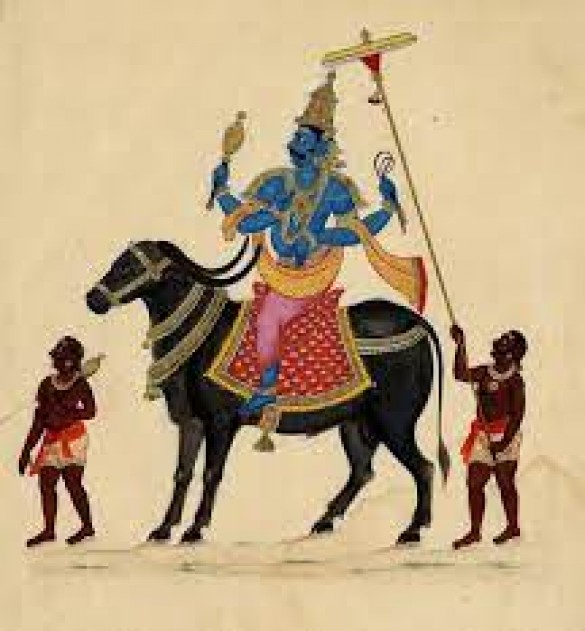
In Hindu mythology, Yama, the god of death, reigns over a realm shrouded in mystery and reverence. His dual role as the deity who guides souls to the afterlife and as the dispenser of justice reflects the complexity of human existence and the profound cycle of life and death. Yama's character embodies both fear and respect, serving as a reminder of the inevitable passage that awaits all living beings. Yama's origins trace back to the ancient Vedic texts, where he is often depicted as the son of the sun god Surya and the goddess Saranyu. As the divine architect of the cosmos, Yama is tasked with shaping the realms of existence and overseeing the orderly progression of the universe. His domain, known as Yama-loka or Naraka, is where souls are said to face judgment and embark on their journey beyond mortal life.
Central to Yama's role is the notion of dharma, the cosmic law that governs moral conduct and righteousness. It is believed that Chitragupta, a divine scribe, meticulously records every action and intention of every individual, thereby determining their destiny in the afterlife. Yama consults these records to ensure that souls are fairly judged based on their deeds, adhering to the principles of karma. Yama is often referred to as Dharmaraja, the king of righteousness, who administers impartial justice to all souls. He holds a balance between compassion and severity, taking into account the ethical choices made by individuals during their earthly existence. Yama is also known as Dandadhara, the holder of the rod of justice, symbolizing his authority and responsibility to maintain cosmic order. Yama is accompanied by his attendants, the fearsome Yamadutas, who assist in escorting souls to the afterlife. Conversely, Yama's twin sister, Yami, embodies the earthly perspective of mortality and immortality. Their relationship is both a reflection of the cosmic balance and a symbolic representation of the intricate relationship between life and death.
While Yama's role is primarily associated with the cycle of birth, death, and rebirth, there are instances in Hindu mythology where he is depicted as a deity who grants liberation, or moksha, to devotees who have achieved a certain level of spiritual enlightenment. This highlights the multifaceted nature of Yama's character, which extends beyond the conventional concept of death.
Yama's influence extends beyond mythology into cultural practices and festivals. In southern India, the festival of Yama Dwitiya is dedicated to honoring Yama, during which sisters pray for the long life and well-being of their brothers. Additionally, Yama's role as a dispenser of justice has inspired narratives that underscore the importance of ethical conduct and the consequences of one's actions.
In the grand tapestry of Hinduism, Yama emerges as a symbol of transformation, guiding souls from the material realm to the ethereal afterlife. His duality as a just dispenser of karma and a liberator from the cycle of rebirth encapsulates the cyclical nature of existence itself. Yama reminds humanity of the impermanence of life, urging individuals to live virtuously and embrace the unknown with humility and courage.
Also read -The Mystical Significance of 108 in Hinduism: Unveiling Cosmic Connections
Significance of Kamakhya Temple, Assam: Exploring Mysticism & Devotion
Ranbir Kapoor's Hidden Start as an Assistant Director Alongside Rishi Kapoor